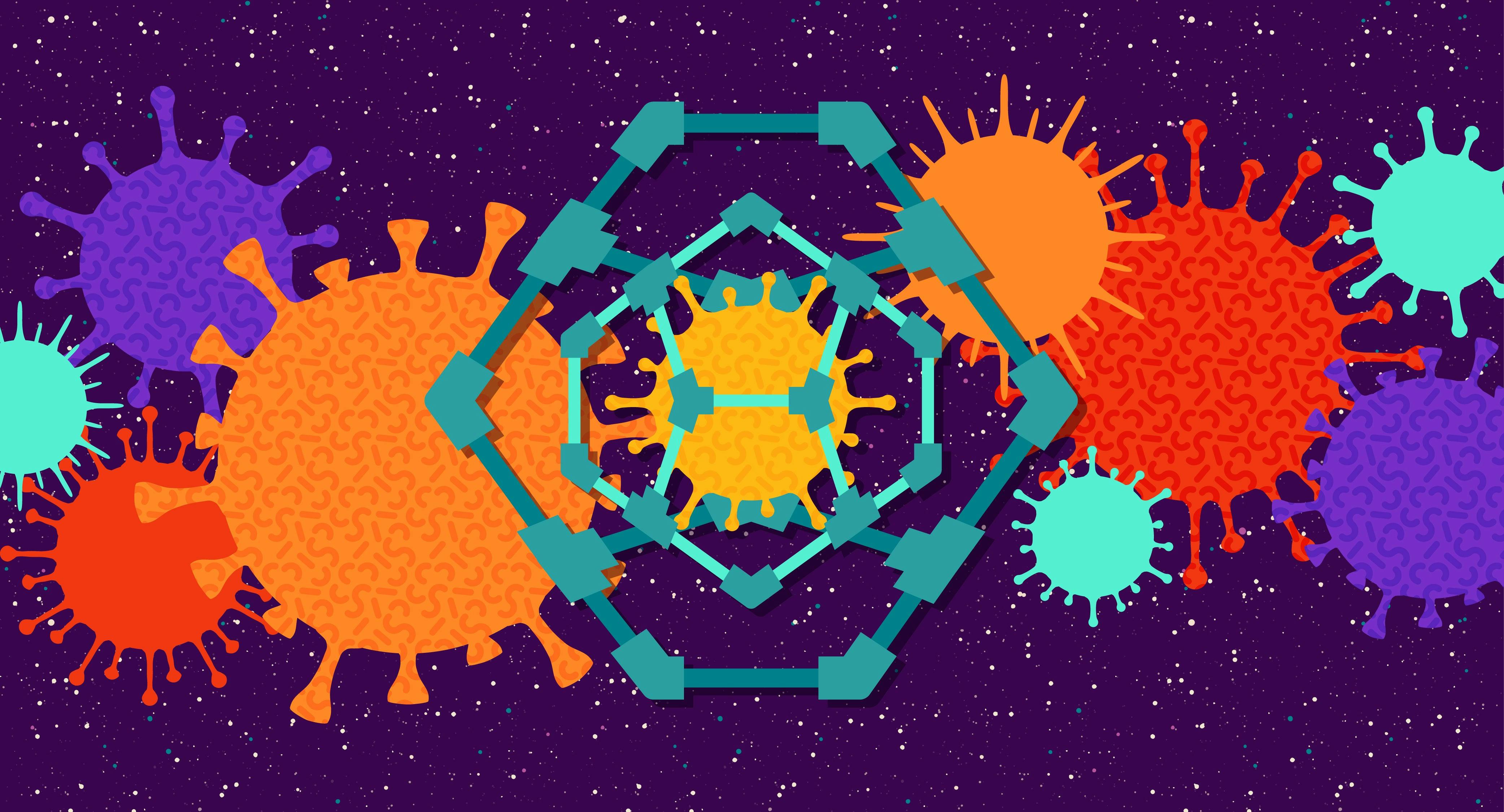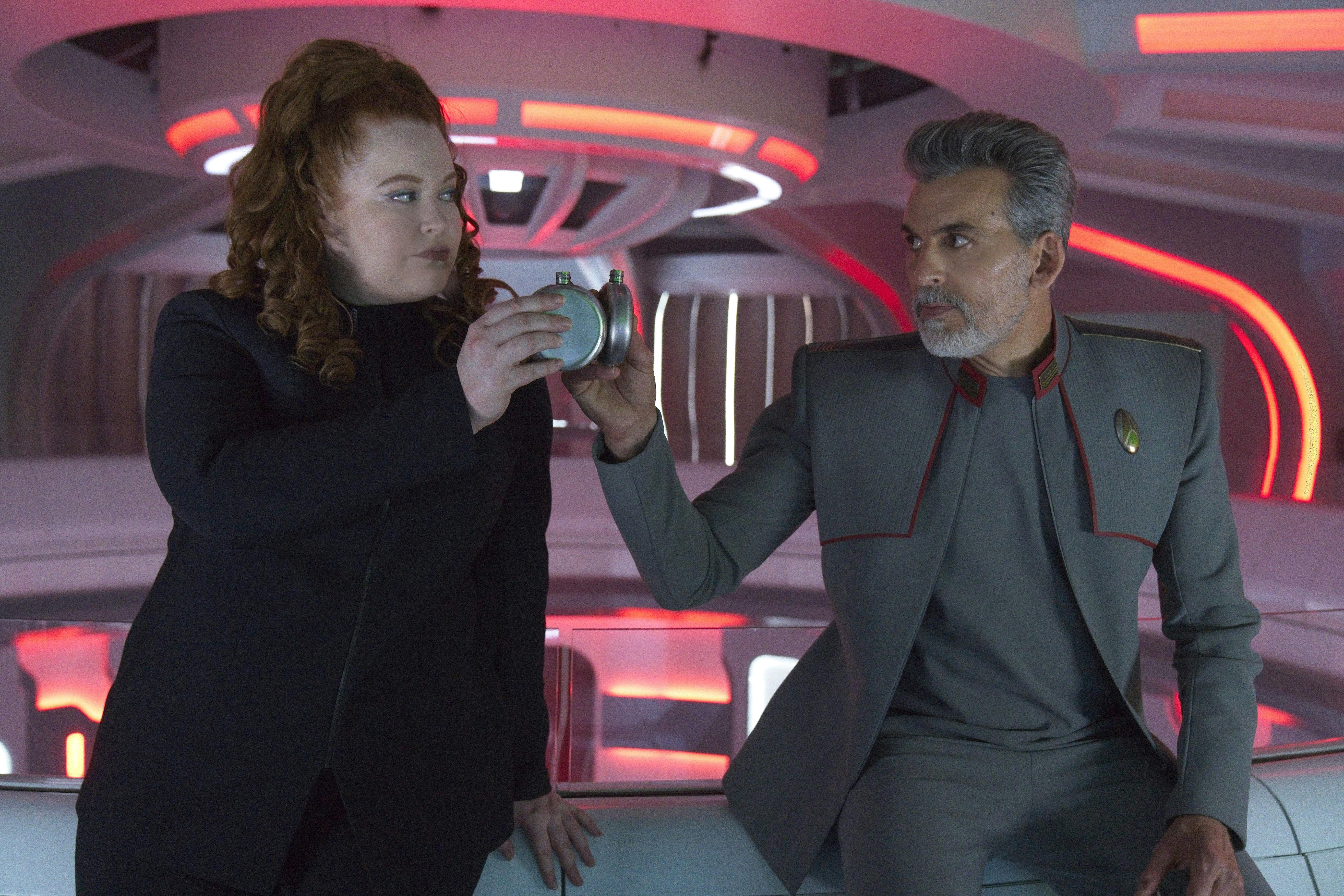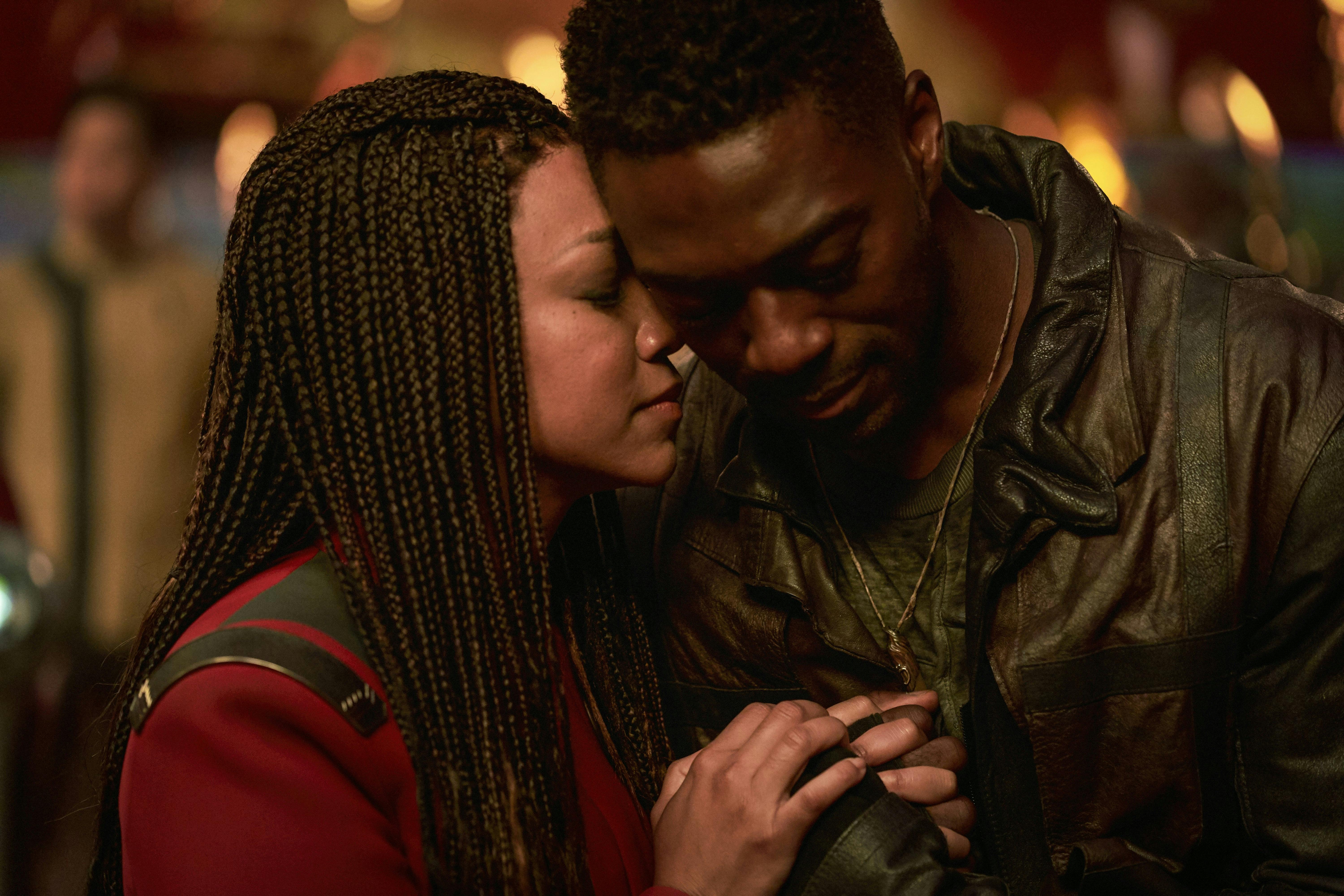Published Jun 1, 2022
How Discovery's DMA Reflects Our Struggle with COVID
"For some that change is positive growth. For others, it can be much harder."

StarTrek.com
Crisis on a global, quadrant, and galactic scale have been a core part of Star Trek since The Original Series. Whether it is cetacean aliens threatening to destroy earth if they can’t find a whale, the Borg traveling back in time to stop Zefram Cochrane’s first warp flight, or the rogue AI, Control, attempting to wipe out organic life once and for all, every Starfleet crew has faced some sort of existential threat on a massive scale. Rarely has that threat, or its repercussions, felt as uncomfortably relatable as the Dark Matter Anomaly (DMA) in Star Trek: Discovery’s fourth season. Mysterious as it is deadly, the DMA simply appears one day, and within hours wipes out an entire planetary system. Scientists scrambled to understand and stop it. Politicians and bureaucrats struggled to establish precautionary measures. Everywhere, ordinary people confront the vulnerability of their existence. Watching this from the comfort of my apartment, where I’ve spent most of the last two years applying for remote work, baking bread, hanging out with friends on Discord voice chat, and taking COVID-19 rapid tests, this crisis was distinctly familiar. Though the differences between the DMA and COVID-19 as phenomena are plentiful and obvious, one being a wormhole and the other being a virus, they leave a similar wake of death, anxiety, and change. When the stability and structure of our lives are injured by a crisis on the scale of the DMA or COVID-19, we are forced to change. For some that change is positive growth. For others, it can be much harder.
Humans are meaning-making creatures. We like to believe that our time spent in this galaxy has a purpose. Psychiatrist Viktor Frankl, emerging from the Nazi concentration camp in which he had spent three years as prisoner, developed his logotherapy on the core belief that finding purpose in your life is the only way out of darkness. Conversely, when our sense of meaning is disrupted or taken away, our lives become much darker. We may even have an existential crisis: a lonesome, anxious confrontation with the perception that life has no meaning and we are each alone. When confronted with your own mortality, especially when interpersonal relationships and social structures like work or church are strained or unavailable, an existential crisis can be hard to navigate. The Morneau Shepell Mental Health Index of Americans in 2020 noted a significant decline in mental health between February and April, when stay at home orders went into effect and COVID started ravaging our communities. Anxiety and depression ran rampant. The things we had relied on to give our lives meaning had disappeared. Even when they hadn’t, when friends and jobs and communities survived, they often didn’t seem to be doing the trick. Something shifted, something felt “off.”

StarTrek.com
That’s how Lieutenant Sylvia Tilly describes her mental state as anxiety and lack of confidence disrupt her life in the DMA’s immediate wake. Her job, the one she had been training for since adolescence, the only life she knew, just didn’t feel right anymore. “Life is just a blink,” she says to Captain Saru, days after the destruction of Kwejian. “It is one heartbeat in the entire lifespan of the universe. I don’t think I really understood that before.” For Doctor Hugh Culber, who already died once before and came back, that lesson was understood all too well. In the wake of the DMA’s destruction, he serves as counselor to the Discovery’s unsettled crew and the scores of traumatized refugees aboard the starship. As he takes on more and more patients, never giving himself a chance to rest, the dawning truth that he cannot simply heal their grief outright, and that he can’t escape his own emotions by focusing on others, threatens to crush him.
Chief among his patients is Cleveland Booker, the sole survivor of the destruction of Kwejian. Mere months after being reunited with his family and culture when he saved them from the oppression of the Emerald Chain, and just minutes after holding his young nephew in a deeply emotional coming of age ritual, Book is forced to watch, helpless, as Kwejian is torn asunder by gravitational rifts. His home is gone, forever. Book’s grief is one of the core plot arcs of Discovery’s fourth season, if not the driving force. Most of us have probably encountered the Kübler-Ross five stages of grief: denial, anger, depression, bargaining, and acceptance. They are often presented like a pathway from one to the next, with acceptance as the ultimate destination. Elisabeth Kübler-Ross was never happy with this interpretation of what was supposed to be a broadly descriptive model of how patients with terminal illness cope with the knowledge that they will soon die. While these five emotions are common to people in grief, they are by no means the full extent of grief, nor are they linear. Grief presents as countless emotions in no predetermined order. Your grief may stay one way for weeks, months, even years at a time, or it might vacillate between emotional states from one second to the next.
Book’s emotional journey is a turbulent one. He bounces between anger at himself and others, deep, silent depression, bargaining for relief, and luminous moments of acceptance that rarely last more than a day or two. While he never denies what happened to Kwejian, his belief that he could have saved his people and that their deaths are his fault, is as unrealistic as it is self-flagellating. This powerful sense of guilt is what keeps him going at first. The weeks after the DMA hit Kwejian find Book following Lieutenant Stamets, eager to assist in any way he can with Stamets’ efforts to combat the DMA. He overworks himself. He submits himself to one, in Stamets’ words, “clinical, forensic discussion of your loss” after another. He volunteers for every suicide mission and lost cause that come across his plate. At first, it seems to be working. He opens up about his loss and even revisits the happy memories of his home. But that light soon fades.

StarTrek.com
Research by the Canadian Institutes of Health Research and the University of Regina, in a paper entitled “Real versus illusory personal growth in response to COVID-19 pandemic stressors” by Asmundson et al, found that while 77% of participants reported experiencing some form of personal growth since the outbreak of the pandemic, a significant portion of that growth was “illusory.”
“Illusory growth was characterized by high growth along with high disability, worsening symptoms over time, and increased use of alcohol… The most common types of growth were developing better appreciation for healthcare workers, having greater appreciation for the value of one’s own life, developing stronger appreciation for friends and family, better appreciating each day, changing priorities about what is important in life, and greater feelings of self-reliance. The least common types of growth related to greater willingness to express emotions, being a more positive person, finding new opportunities, and establishing a new path in life… 49% of the sample reported higher levels of [growth] but with differing patterns of disability and changes in symptom severity over the course of the pandemic… The combination of self-reported personal growth accompanied by deteriorating emotional health and functional capacity suggests the possibility of illusory growth, a form of ineffective coping.”
In simpler terms, like Book, a lot of us have been clinging to lifelines and seeking meaning in the madness, even as our mental health has declined and our material reality has grown harsher. Book’s attempts to help are not constructive processing of his trauma. They are attempts at distraction and self-destruction. He goes to therapy hoping it will cure his pain, not help him learn how to navigate it. When his coping mechanisms fail, he takes drastic steps. His relationship with Michael crumbles, he makes an enemy of himself to the crew, and he falls in with an irrational and self serving ideologue who offers him a chance for redemption. He becomes a reactionary.
Book’s collapse under the weight of his own grief is not a sealed fate for those in a similar position. For Tilly, the tenets of the Qowat Milat become a key part of her healing journey. Serving on a joint mission with the Order in the episode “Choose to Live,” she gets a chance to learn about their philosophies. As Gabrielle Burnham explains, “Paths end and change throughout everyone’s life… You either move on to a new path and live, or stay and die… In everyday life, a path’s end can be harder to recognize. You must be willing to look inside yourself with absolute candor.” The candor practiced by the Qowat Milat can be intimidating. It is also deeply compassionate, an honesty that seeks to liberate those on a doomed path. Tilly turns the candor in on herself and finds dissatisfaction with her career. She gets off that path, starting a new one, one that she instantly finds more fulfilling. Hugh Culber finds himself saved by a similar “brutal honesty” from Doctor Kovich. His value as a healer, a duty he stakes his whole sense of self on, is threatened by his inability to take away his patients’ fear, anxiety, and depression. Kovich cuts through Culber’s defenses with the sharpness of a Qowat Milat blade, revealing the insecure, guilt-ridden survivor beneath, and implores him to seek something besides his work on which to moor himself. Sure enough, the next time we see Hugh, we find him walking off hand in hand with his husband for a garden stroll.
The core of this season of Discovery is life growing in its darkest moments. Tilly and Culber find new paths to heal what’s broken inside of them. Gray, having lived as practically a ghost for months, finds a new body, in a stunning character arc that felt intimately familiar for many of us who have come out as trans over the past few years of private self-reflection. Saru and Ni’Var President T’rina, two elder statespeople who cut themselves off from affection and attachment lifetimes ago, find a spark of warmth and love that becomes key in forging communications with the Ten-C in the season’s final episodes. The ship’s computer itself, Zora, develops sentience.This is not a technological development, but a psychological one from her time with Discovery’s emotionally open crew. Candor and compassion are central to how Discovery - both ship and show - approach and resolve daunting crises. Even Book finds his way towards healing, though it comes almost too late. Spurned by Jet Reno’s incisive remarks, Book begins to reexamine his situation and recognizes mad scientist Ruon Tarka not as savior but as the terminus of Book’s doomed path. Tarka lost the only person he ever loved and with him the only significant link he had to the rest of the world. The man we see in this season is a spiral of self-aggrandizing chaos - willing to do anything, say anything, hurt anyone - in his quest towards a personal valhalla where the burden of his grief would be lifted. But that burden can never be lifted. It can only be shared.
Book stops Tarka with yet more candor, showing him how his lost love Oros would have never wanted this egoistic vengeance. He frees the imprisoned Reno and rejoins Michael. When he comes face to alien face with the engineers of the DMA, he speaks to them not just of justice and harm, but of restoration. He is honest with them, and implores them to be honest with themselves. He takes his own words to heart, and for the first time since the destruction of Kwejian, begins to actually heal. He starts off on a new path, an unknown one with risks and pain to be expected, but one that may actually let him live.

StarTrek.com
It is vital to note the differences, not just between the DMA and COVID-19 as scientific phenomena, but as crises. For one, the DMA crisis is resolved within a few months. Meanwhile, we will be dealing with the coronavirus indefinitely. In fact, it is likely it will continue to be a part of our lives in some way for a very, very long time. Hopefully, a small part, but that remains to be seen. For another, crises are not just handled by individuals. They’re handled by governments, systems, and societies. In Star Trek, we see a compassionate, humanitarian Federation reach out to other political bodies to work with them, forge alliances, and solve this crisis while mitigating harm to the maximum extent possible. In our world, patents and medical markets have created vaccine apartheid, where some nations hoard supplies for a sense of false security while others suffer. In Star Trek, the comorbid breakdowns in the social order like Book’s reactionary tactics, General Ndoye’s collaboration, or Qowat Milat sister Jivini’s acts of terrorism, are met with compassion and understanding, placed into the social context of the traumatic and terrifying time they are living in. In our world, the ongoing social issues of housing inequality, lack of health care, a militarized and prejudiced police force, and so much more became unignorable under the stresses of the pandemic, but the subsequent social unrest has gone largely ignored, often violently silenced. So many of us have worked so hard to practice compassion and absolute candor with one another and ourselves, to heal the wounds between and within us, whether social or psychological. Many of us see ourselves, our communities, and our world at the end of one path. As the President of United Earth tells Captain Burnham, “There’s a lot of work to do.” Are we ready for that?
July Brown (she/her) is a writer, musician, video editor, and all around nerd based out of New York City. You can find her at julybrown.com or watch her struggle with the character limit on twitter @julybwrites
Star Trek: Discovery currently streams exclusively on Paramount+ in the U.S. Internationally, the series is available on Paramount+ in Australia, Latin America and the Nordics, and on Pluto TV in Austria, France, Germany, Italy, Spain, Switzerland and the United Kingdom on the Pluto TV Sci-Fi channel. In Canada, it airs on Bell Media’s CTV Sci-Fi Channel and streams on Crave. Star Trek: Discovery is distributed by Paramount Global Distribution Group.
